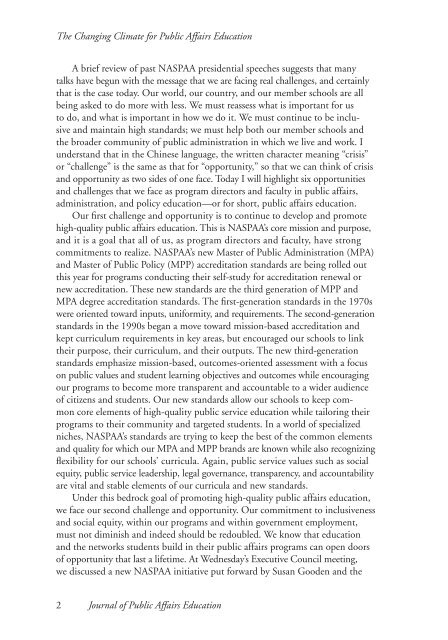Journal of Public Affairs Education
You also want an ePaper? Increase the reach of your titles
YUMPU automatically turns print PDFs into web optimized ePapers that Google loves.
The Changing Climate for <strong>Public</strong> <strong>Affairs</strong> <strong>Education</strong><br />
A brief review <strong>of</strong> past NASPAA presidential speeches suggests that many<br />
talks have begun with the message that we are facing real challenges, and certainly<br />
that is the case today. Our world, our country, and our member schools are all<br />
being asked to do more with less. We must reassess what is important for us<br />
to do, and what is important in how we do it. We must continue to be inclusive<br />
and maintain high standards; we must help both our member schools and<br />
the broader community <strong>of</strong> public administration in which we live and work. I<br />
understand that in the Chinese language, the written character meaning “crisis”<br />
or “challenge” is the same as that for “opportunity,” so that we can think <strong>of</strong> crisis<br />
and opportunity as two sides <strong>of</strong> one face. Today I will highlight six opportunities<br />
and challenges that we face as program directors and faculty in public affairs,<br />
administration, and policy education—or for short, public affairs education.<br />
Our first challenge and opportunity is to continue to develop and promote<br />
high-quality public affairs education. This is NASPAA’s core mission and purpose,<br />
and it is a goal that all <strong>of</strong> us, as program directors and faculty, have strong<br />
commitments to realize. NASPAA’s new Master <strong>of</strong> <strong>Public</strong> Administration (MPA)<br />
and Master <strong>of</strong> <strong>Public</strong> Policy (MPP) accreditation standards are being rolled out<br />
this year for programs conducting their self-study for accreditation renewal or<br />
new accreditation. These new standards are the third generation <strong>of</strong> MPP and<br />
MPA degree accreditation standards. The first-generation standards in the 1970s<br />
were oriented toward inputs, uniformity, and requirements. The second-generation<br />
standards in the 1990s began a move toward mission-based accreditation and<br />
kept curriculum requirements in key areas, but encouraged our schools to link<br />
their purpose, their curriculum, and their outputs. The new third-generation<br />
standards emphasize mission-based, outcomes-oriented assessment with a focus<br />
on public values and student learning objectives and outcomes while encouraging<br />
our programs to become more transparent and accountable to a wider audience<br />
<strong>of</strong> citizens and students. Our new standards allow our schools to keep common<br />
core elements <strong>of</strong> high-quality public service education while tailoring their<br />
programs to their community and targeted students. In a world <strong>of</strong> specialized<br />
niches, NASPAA’s standards are trying to keep the best <strong>of</strong> the common elements<br />
and quality for which our MPA and MPP brands are known while also recognizing<br />
flexibility for our schools’ curricula. Again, public service values such as social<br />
equity, public service leadership, legal governance, transparency, and accountability<br />
are vital and stable elements <strong>of</strong> our curricula and new standards.<br />
Under this bedrock goal <strong>of</strong> promoting high-quality public affairs education,<br />
we face our second challenge and opportunity. Our commitment to inclusiveness<br />
and social equity, within our programs and within government employment,<br />
must not diminish and indeed should be redoubled. We know that education<br />
and the networks students build in their public affairs programs can open doors<br />
<strong>of</strong> opportunity that last a lifetime. At Wednesday’s Executive Council meeting,<br />
we discussed a new NASPAA initiative put forward by Susan Gooden and the<br />
2 <strong>Journal</strong> <strong>of</strong> <strong>Public</strong> <strong>Affairs</strong> <strong>Education</strong>



